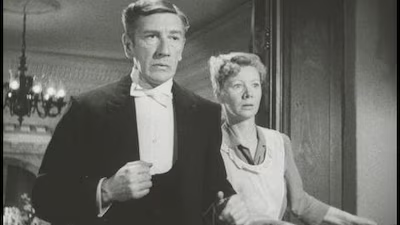Judith Anderson

About
Biography
Filmography
Family & Companions
Notes
"I like emotional roles because they permit unleashing of one's feelings." --Judith Anderson in THEATER MAGAZINE (1924), quoted in THE NEW YORK TIMES obituary (January 4, 1992)
"We live, we breathe, we experience, we die, we love, we hate, we experience beauty and tragedy, and we find it in the parts we play. Whatever I do, I'm passionate about." --Judith Anderson discussing the actor's craft in 1984 (quoted in THE NEW YORK TIMES obituary, January 4, 1992)
Biography
A leading Broadway star from the 1920s through the '50s, Judith Anderson was perhaps most famous for her award-winning performance as "Medea" in 1947; as a formidable Lady Macbeth (opposite Laurence Olivier in London in 1937 and Maurice Evans on Broadway in 1941), and as an interpreter of the neurotic heroines of Eugene O'Neill (Nina in "Strange Interlude" in 1928 and Lavinia in "Mourning Becomes Electra" in 1932). Anderson made her film debut in 1933 and played the sinister housekeeper Mrs. Danvers in Hitchcock's "Rebecca" seven years later. It was the first, and most memorable, in a series of malevolent character roles that made good use of her commanding presence. Cast against type, Anderson made an effective Big Mama in Richard Brooks' film adaptation of "Cat on a Hot Tin Roof" (1958). Late in her career she gained a new following as campy grande dame Minx Lockridge on the NBC soap opera "Santa Barbara."
Filmography
Cast (Feature Film)
Cast (Special)
Life Events
1915
Stage debut in "A Royal Divorce" at the Theater Royal in Sydney, Australia
1918
Went to Hollywood with a letter of introduction to Cecil B DeMille, who rejected her for the movies
1918
New York stage debut (Broadway stock) at the 14th Street Theatre
1924
Broadway debut in "The Cobra"
1933
Film debut, "Blood Money"
1937
London stage debut, "Macbeth" at the Old Vic
1947
Starred on Broadway in landmark production of "Medea" (which ran 214 performances), adapted specifically for Anderson from Euripides's drama by poet Robinson Jeffers; followed Broadway run with an eight-month coast to coast tour
1949
Returned to Broadway to star as "Medea" at the City Center
1954
Played Lady Macbeth on "Hallmark Hall of Fame"
1954
Appeared on TV's "Light's Diamond Jubilee"
1960
Again played Lady Macbeth on a "Hallmark Hall of Fame" broadcast
1971
Starred on stage in title role of "Hamlet" at Carnegie Hall in New York
1982
Played the nurse in a Broadway revival of "Medea"; production broadcast on PBS (1983)
1984
Former Lion Theater on West 42nd Street in New York (Theater Row) renamed the Judith Anderson Theater
1984
Featured in a regular role on TV soap opera, "Santa Barbara"
1986
Narrated feature, "Impure Thoughts"
1991
Hospitalized in Santa Barbara with a stroke (August)
Photo Collections
Videos
Movie Clip












Trailer








Family
Companions

Bibliography
Notes
"I like emotional roles because they permit unleashing of one's feelings." --Judith Anderson in THEATER MAGAZINE (1924), quoted in THE NEW YORK TIMES obituary (January 4, 1992)
"We live, we breathe, we experience, we die, we love, we hate, we experience beauty and tragedy, and we find it in the parts we play. Whatever I do, I'm passionate about." --Judith Anderson discussing the actor's craft in 1984 (quoted in THE NEW YORK TIMES obituary, January 4, 1992)
Named Dame Commander of the British Empire in 1960 by Queen Elizabeth II for "distinguished contributions to the stage".
Received the Australian Commander Award given by Queen Elizabeth (1991).











